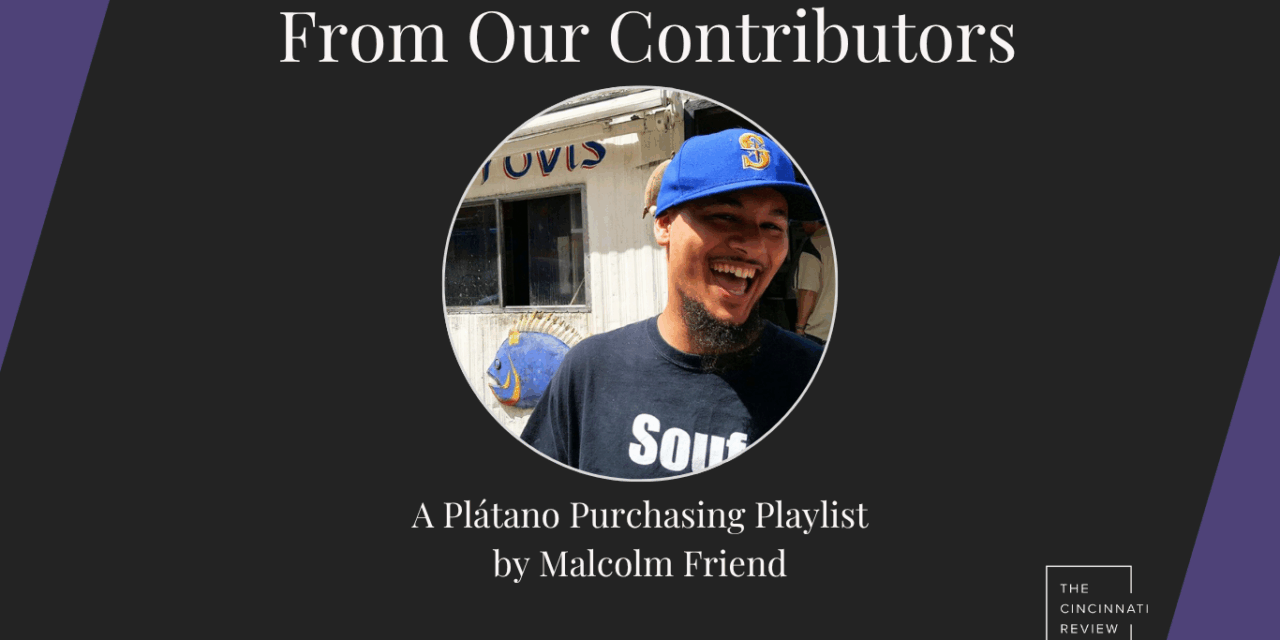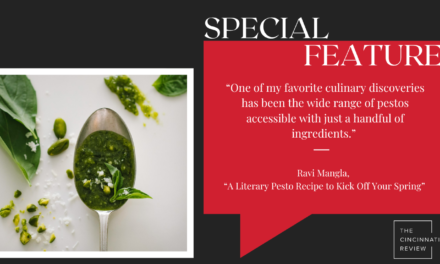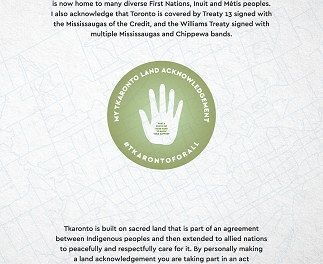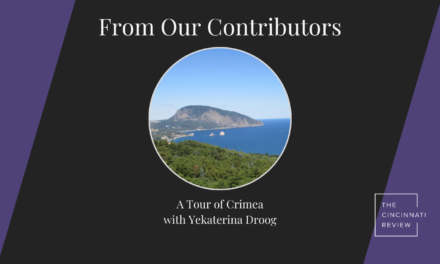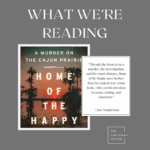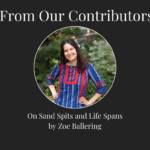6 minutes read time

Web and Media Editor Bess Winter: Malcolm Friend’s prose poem, “Plátano Purchasing Theory,” which appears in issue 22.1, explores identity and diaspora by examining the speaker’s ways of seeing a delicious, and often mispronounced, starch. To tantalize our taste buds further, Malcolm has kindly provided us with a plátano purchasing playlist to fill your earbuds during those long, lonely trips to the grocery store. Read his countdown below.
Plátano Purchasing Playlist
My poem “Plátano Purchasing Theory,” part of The Cincinnati Review Issue 22.1, is what some may (disparagingly or affectionately) call a Diaspora Poem™. The second such poem of mine with this title, it follows a number of poems of mine utilizing plátano/plantain (words I use interchangeably being of both Puerto Rican and Jamaican heritage) as a way to examine my diasporic Caribbean identity. It’s become a staple (all pun intended) of my work.
This particular poem was born partially out of two recurring frustrations. The first was not being able to reliably get plantain at the grocery store when I lived in Pittsburgh. Some weeks, the local Giant Eagle would have them, but others I’d go to the produce section and their space would be empty, prompting an unwanted trip to Whole Foods. The second was how many times I was asked if I meant to get plátano (instead of bananas) when checking out at either location. At various points I wanted to yell, “I’m Caribbean! I know what plantain is!”
But this poem was also born out of all of the wonderful memories I’ve formed around plátano: the day my dad brought home food from El Pilón, a Puerto Rican restaurant in Seattle’s South End that closed soon after that meal—the first time I ever ate Puerto Rican food since he didn’t cook; the first meal I cooked for my wife, tostones and rice and beans; cooking and eating mofongo with my fellow Black Plantain, JR Mahung, a challenge since I had to cook it for the first time without chicharrón; dinner with my VONA workshop group, JR and me having to improvise plates of chicken, rice and beans, and tostones in what was supposed to be a full kitchen but ended up being a Foreman Grill and electric wok; eating mangú at a Dominican restaurant with the homies after a reading Yesenia Montilla set up at Word Up; walking twenty minutes to Columbia University with Michelle Moncayo and immediately napping in an empty classroom after a mofongo lunch.
To accompany my poem, I’ve put together a short Plátano Purchasing Playlist consisting of my top five songs about/featuring plantain:
5. “Somos Pacífico” by ChocQuibTown
This one feels like cheating. The only reference to plátano is in a line from Tostao about eating plátano con queso for breakfast. But I’ve always dug the work ChocQuibTown does representing Black Colombians. This song, a blend of currulao and hip hop, immediately spoke to me when I first heard it in college, in no small part because I could pretend their pride in being from Colombia’s Pacific Coast extended to my pride in being from the Pacific Northwest.
4. “Plátano Maduro” by Junior Gonzalez
There are a few different versions of this song—a merengue by Nelson Cordero, a cumbia by Los Bestiales—, but Junior Gonzalez’s salsa rendition has to be my favorite. There’s just something about that opening with the tres that sets the song up perfectly. Again, this feels like a little bit of a cheat, as the song isn’t really about plátano. Instead, this heartbreaking track uses the plátano as a metaphor, the aging Juancho being reminded by his fickle love that a ripe plantain will never be green again and that the time that’s passed is never coming back.
3. “BG Plantain” by The Mighty Sparrow
This is the first song that is actually about plantain, and even then, it also isn’t about plantain. As most great calypsonians do, The Mighty Sparrow mixes in both political commentary and sexual innuendo. This song was a response to Eric Williams, the doctor referenced in the song and the first Prime Minister of Trinidad and Tobago (he also led the nation pre-independence as a British colony), banning the import of plantain from then-British Guiana (known for its larger size) allegedly to protect local produce but perhaps actually because he was upset with Forbes Burnham, his counterpart in British Guiana, for signing a trade deal with Jamaica (definitely can’t relate to politicians starting trade wars based on personal vendettas now, right?). One of multiple songs Sparrow penned in critique of Williams, in this one he takes on a female voice, where the political critique is supplemented—masked? enhanced?—by some raunchy innuendo, Sparrow’s female complainant lamenting that “Trinidad plantain ain’t good at all…de plantain here in dis place too small, too soft, and ain’t got no blasted taste, but one BG plantain does fill up de pot.” As a sidenote, I’m not the first poet to admire the work of The Mighty Sparrow. Kamau Brathwaite places him as a pivotal source in the foundation of Anglo-Caribbean poetry in History of the voice.
2. “Fry Plantain” by Lila Iké, featuring Joey Bada$$
Finally, a love song about plantain! Obviously, Lila Iké’s vocals are the main attraction on this track, and I agree that there are few things more romantic than cooking plantain for your love (just ask my wife, who’s had to get used to it becoming a staple of her diet over the decade we’ve been together). And like Sparrow’s “BG Plantain,” this song also uses food to turn to the sexual. However, another thing drawing to this song by the way it frames food as central to culture. Iké, near the song’s closing, insists not only on plantain for breakfast but also breadfruit and ackee (Jamaica’s national fruit, also known to be toxic if not prepared properly). Joey Bada$$, a diasporan himself born in Brooklyn to a St. Lucian mother and Jamaican father, marks a stark difference between a traditional meal and American fast food in his verse (sorry to Applebee’s for catching a stray there) when referring to Iké before shifting from English to a little bit of Patois. Maybe it’s just the Diaspora Poet™ in me reading too much into things, but this song uses food to bring homeland and diaspora together.
1. “Mofongo Pelao” by Cortijo y Su Combo
Cortijo y Su Combo holds a special place in my heart, in no small part because Ismael Rivera (the lead singer, known affectionately as Maelo to boricuas), is my all-time favorite Puerto Rican singer. The group is renowned for making bomba and plena music—Puerto Rico’s Black folk music—popular music, releasing classics such as “El Negro Bembón,” “Alegría y Bomba,” and “A Bailar Mi Bomba.” “Mofongo Pelao” follows in this tradition, albeit in a much more playful manner. Rivera sings of a woman whose been instructed by her doctor that she needs to change her diet, replacing dishes such as bacalao guisao (salt cod stew) with salads and eating her mofongo (Puerto Rico’s national dish, consisting of mashed plátano) “pelao” (without chicharrón). Her response? “¡Yo no como mofongo pelao!” While I will not join her and shout this at my doctor, I will echo Maelo’s closing to the track: “¡Dale mofongo!”
Malcolm Friend is a poet from the Rainier Beach neighborhood of Seattle, Washington and the author of the chapbook mxd kd mixtape (Glass Poetry, 2017) and the full-length collection Our Bruises Kept Singing Purple (In-landia Books, 2018). With JR Mahung he is a member of Black Plantains, an Afro-Caribbean poetry collective.

